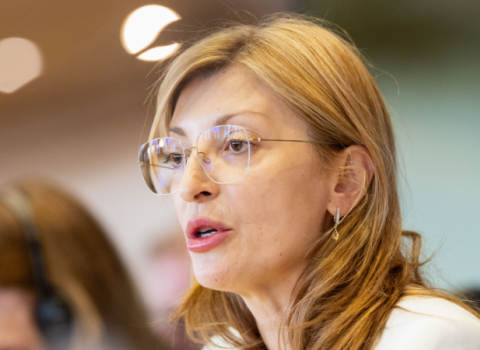
ERAB chair John Wood: “We cannot afford to go ahead with 27 different programmes.”
Part 1 – European Dreams: Science in 2030
Part 2 – Science and the Internet
“ERAB is putting the bar very high for European research and innovation policy,” said Commissioner for Science and Research Janez Potočnik, who called the report’s recommendations “ambitious and highly valuable”. It “raises the level of ambition as we move into the second decade of ERA.”
A successful ERA is essential to help Europe tackle the challenges facing society, such as global warming, water scarcity, energy shortages and healthcare, according to the report, entitled "Preparing Europe for a New Renaissance – A Strategic View of the European Research Area".
“Fighting climate change, to pick just one of the grand challenges on the horizon, will require as much effort in terms of changing our ways of living and working globally as it required the Middle Ages to get rid of feudalism,” the report states. “And just as in that ‘first’ European Renaissance, we now need new ways of thinking, to enlighten new solutions.”
The board highlights six areas where it says action must be taken by 2030:
Creating a united ERA where ideas and people can move freely.
Solving society’s grand challenges, such as climate change and energy supply.
Ensuring the interaction of science, policy and society.
Developing an ERA where the public and private sectors collaborate in open innovation.
Encouraging excellence.
Promoting cohesion across the continent.
For each area, the report sets out milestones to measure how much progress is being made. The board, chaired by John Wood from Imperial College London, is now working on specific proposals to achieve these goals.
“In view of the challenges our planet and Europe face, we must act, and act now. Otherwise, Europe will not only become marginalised in a global market, but will fail to contribute to solving our greatest challenges,” the report says.
ERAB, which has shared its ideas with Commission officials over the past year, welcomes the recent announcement by Commission President José Manuel Barroso to appoint a chief scientific adviser who “has the power to deliver proactive, scientific advice throughout all stages of policy development and delivery”. Independent scientific advice needs to be embedded within policy-making as science impacts almost every portfolio; a chief scientific adviser will help ensure that policy doesn’t fall between departments, according to the board.
Restoring trust between science and society is also key, says ERAB, which proposes establishing a new social contract based on the “3 Rs” of Rigour, Respect and Responsibility: rigour in decision making, political or scientific; respect for our fellow man, scientist and environment; responsibility for our own actions as scientists and citizens.
The issues holding Europe back include insufficient funding at research universities, the mobility of researchers being hampered by outdated tenure, pension and social security systems, and conflicting national regulations and tax regimes that make it difficult, for example, to set up a new research facility in the ERA.
“We cannot afford to go ahead with 27 different programmes,” ERAB chair John Wood, from Imperial College London, said today, emphasising the need for a coherent policy that delivers real solutions.
“Much remains to be done to make a new Renaissance by 2030 possible,” according to the ERAB report, whose key message is that now is the time to act if Europe is to survive and flourish in this changing world.
ScienceBusiness was rapporteur to ERAB.





 A unique international forum for public research organisations and companies to connect their external engagement with strategic interests around their R&D system.
A unique international forum for public research organisations and companies to connect their external engagement with strategic interests around their R&D system.